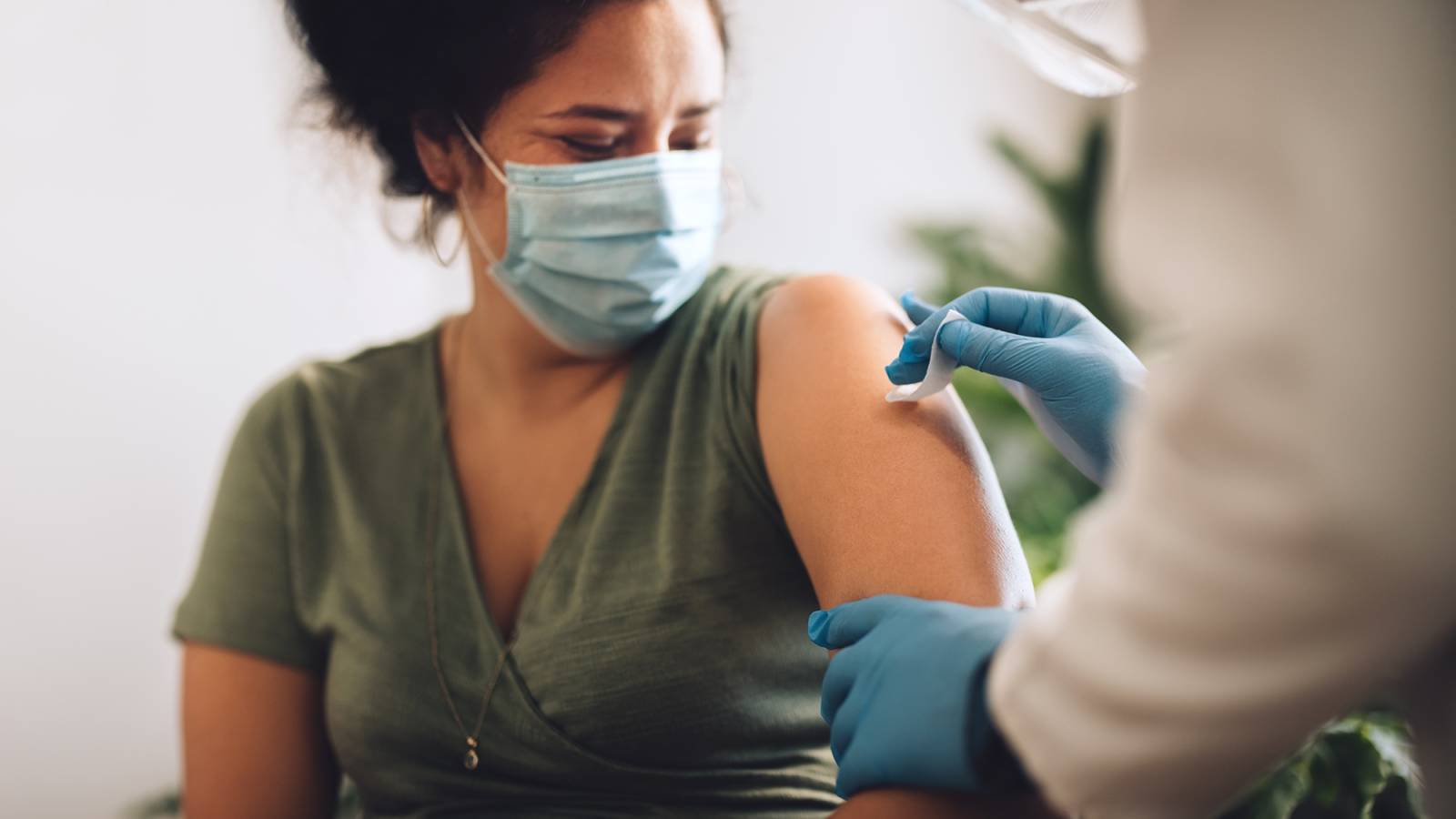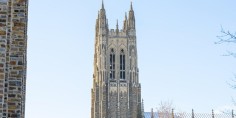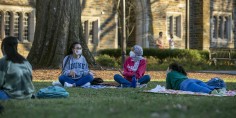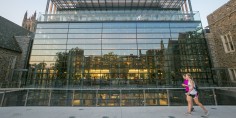In 1998, Eboo Patel was attending a conference on interreligious engagement at Stanford University when he noticed how few young people were in the audience. The experience inspired him to launch Interfaith Youth Core “to make interfaith cooperation a vital part of the college experience, and ultimately a positive force in our society.” Now a national nonprofit, its network includes more than 100,000 students, faculty and staff at more than 600 schools. Its strategy is “rooted in the power and promise of U.S. higher education.”
This spring, The Duke Endowment began supporting the organization’s Faith in the Vaccine Ambassadors initiative to help higher education institutions and faith communities in the Carolinas reach Black, Latino or Indigenous people who are hesitant about COVID-19 vaccines. The initiative trains student to be vaccine ambassadors in culturally sensitive ways. Outreach includes coordinating transportation to vaccine clinics, organizing social media campaigns, and hosting public information forums with local health officials. By design, the program engages many students from minority groups marked by lower vaccine uptake rates.
Through two grants totaling $1.2 million, the Endowment will support 20 campus teams in North Carolina and South Carolina through August 2022.
1. Background
Over the past year, Interfaith Youth Core has partnered with campuses to respond to pandemic-related challenges in their communities. One such partnership began in summer 2020, with Bridge Builders Charlotte. Anchored at Queens University of Charlotte, Bridge Builders linked students and faculty from Queens, Central Piedmont Community College, Davidson College, Johnson C. Smith University and Wingate University to help faith communities and nonprofits address pandemic-related needs such as food insecurity and student learning loss.
Interfaith Youth Core launched the Faith in the Vaccine Ambassadors initiative in March 2021. Described as a model that combines data-informed strategies with on-the-ground programming, the goal is to partner with diverse communities “to meet the urgent priority of vaccination in our nation.”
Through the work, 1,600 people — including college students, campus staff, religious leaders, and community organizers from 108 campuses and 90-plus civic and faith-based institutions — have been trained to address vaccine hesitancy and access in their local communities.
This video tells a few of their stories.
2. Assessing the Opportunity
Leaders at Interfaith Youth Core say they created resources and curricula for the program based on two national surveys on the intersection of religion, race and vaccine hesitancy.
In the first religion and vaccine survey, the organization teamed with Public Religion Research Institute to discover that about 25 percent of all vaccine-hesitant Americans — and 36 percent of Black Protestants and 33 percent of Hispanic Americans who were vaccine hesitant — said that one or more faith-based approaches would make them more likely to get vaccinated. A faith-based approach could include a religious leader encouraging vaccine acceptance, for example, or a faith community holding vaccine information sessions and clinics.
The survey was released in April 2021.
3. Follow Up Survey
In July 2021, the two groups released findings from a second wave of national polling. This survey indicated that faith-based approaches had contributed to increases in vaccine acceptance since March and continued to hold promise for persuading some people to get vaccinated. Findings included:
- A majority of Hispanic Protestants who were vaccinated and attended religious services (54 percent) said one or more faith-based approaches encouraged them to get vaccinated. The same was true for one in four church-going white evangelical Protestants (26 percent) and white Catholics (25 percent).
- Even among vaccine refusers, faith-based approaches could be persuasive, with nearly one-fifth of vaccine refusers (19 percent) saying one or more faith-based approaches would make them more likely to get vaccinated.
- Logistical barriers to vaccination still existed for substantial portions of Black, Hispanic, and younger Americans. Barriers included not having time to get vaccinated or deal with possible side effects, preexisting health conditions, and lack of access to childcare.
4. Meeting the Challenge
The Endowment’s first grant of $200,000 in April 2021 supported the Faith in the Vaccine initiative at five Charlotte-area campuses: Central Piedmont Community College, Davidson College, Johnson C. Smith University, Queens University of Charlotte, and Wingate University.
Along with our support, funding from other foundations and private donors helped the initiative engage more than 100 campuses across the United States, including an additional 10 schools in the Carolinas.
One of the model’s key elements is “trusted messengers, trusted messages.” Leaders say that by recruiting and training ambassadors to work in their local communities, and by partnering with faith-based and faith-inspired institutions, the initiative focuses on two critical aspects of a culturally competent strategy: make it familiar and make it comfortable.
Endowment Trustees approved a $1 million grant to Interfaith Youth Core in November 2021 to continue and expand the work throughout the Carolinas.
5. Progress
In the first three months following the Endowment’s initial grant:
- The five campuses identified and trained a diverse group of 40 student ambassadors.
- The students partnered with 12 Charlotte-area faith communities and nonprofits with ties to BIPOC communities.
- Through more than 50 educational outreach events and 30 vaccine clinics, more than 600 people received vaccines.
Program leaders also reported a ripple effect, where one person’s decision to get vaccinated led to increased vaccination rates among family and friends.
Another important impact involves the student ambassadors. Through peer-to-peer vaccine advocacy, and access to regular training and collaboration across campuses and with community partners, the unique learning opportunity helped students develop critical communication, negotiation and bridgebuilding skills.
To learn which interventions and communications strategies work best — and to be able to change course in real time — Interfaith Youth Core is conducting an ongoing evaluation.
6. Update
The Endowment’s November grant will help Interfaith Youth Core build on its successes by expanding the vaccine initiative to BIPOC populations in North Carolina and South Carolina. Here’s the plan for the funding:
- 20 Campus Vaccine Ambassador Teams. Most of the Endowment’s support will fund 20 North Carolina and South Carolina campus teams of eight student ambassadors, one faculty or staff mentor, and at least two community partners through August 2022.
- Public Religion Research Institute’s Carolinas-Specific Study. The efforts so far have relied on national data from the Institute’s two surveys. To guide on-the-ground interventions locally, Interfaith Youth Core plans to hire the Institute to conduct a Carolinas-specific study of vaccine uptake, hesitancy and access among minority populations.
- Curriculum Development Tied to Research. Based on the research, Interfaith Youth Core will tailor its training curriculum, including new modules on vaccinating children and strategies for persuading vaccine hesitant parents.
7. Final Words
From Johnson C. Smith University student Jackson Kakwenya in “Have a Little Faith”: “I’ve learned how to observe and listen more, which data to use when speaking to people about the COVID-19 vaccine and in what stage of the conversation. I’ve learned how to find common ground and that the best thing I can do is to enlighten people, not force information on them.”








